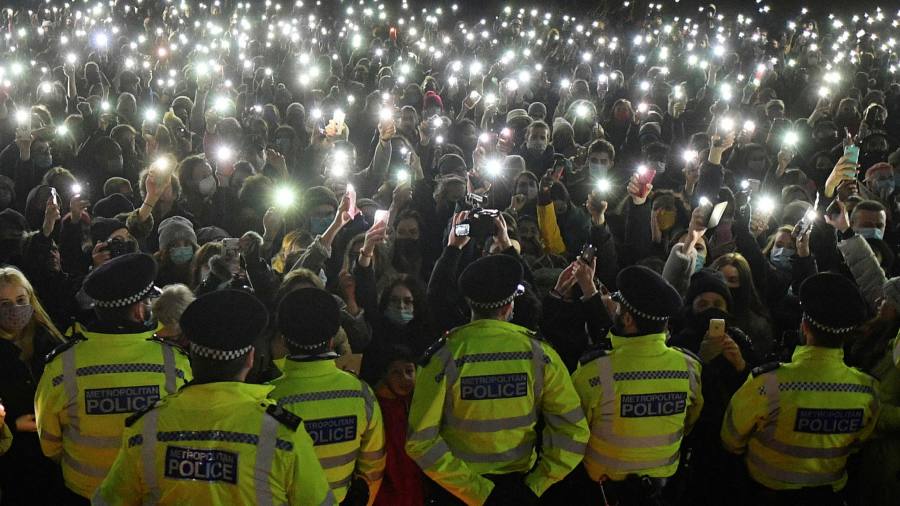[ad_1]
Every so often an incident occurs that touches a collective nerve, catalysing a shared experience or emotion. Revelations of complaints against the Hollywood mogul Harvey Weinstein sparked the international #metoo movement against the sexual abuse of women. The kidnap and murder — allegedly by a police officer — of 33-year-old Sarah Everard as she walked home at night in London is doing something similar with violence against women on the streets. The outrage has been compounded by the Metropolitan Police’s ham-fisted clampdown on a vigil for the victim, on the grounds that it broke lockdown rules. Images of peaceful women pinned to the ground by male police have prompted shock and disbelief.
Dame Cressida Dick, the Metropolitan Police commissioner, was correct when she noted before Saturday’s vigil that abductions of women off the street are “incredibly rareâ€. Yet add in the routine verbal and physical harassment, and the indecent exposure, stalking and domestic violence to which so many women are exposed and — in a message now resounding across social media — a feeling of fear is something women and girls live with all the time. Across the world in Australia, women marched in their thousands on Monday in protests over a wave of sexual assault allegations centring on the country’s parliament.
The response should begin with listening sensitively to women’s complaints, and allowing protests or acts of memorial or solidarity to happen, even in a pandemic. Saturday’s London vigil could have been held in a Covid-safe way — as some others were elsewhere — had police agreed to work with organisers on safeguards. Women had to gather instead without permission or Covid protections.
Curbing violence against women will require changes in culture and attitudes, and how boys are educated and raised. But gains could be had from reforming how police, prosecutors and the courts deal with the issue, and reversing the past decade’s funding cuts that have hampered this work. The Police, Crime, Sentencing and Courts Bill in the Commons this week — despite its worrying proposals to give police extra powers to control protests — provides an opportunity for reform, though it needs amendment.
Campaigners and the opposition Labour party are calling for increased minimum sentences for rapists and stalkers. A priority is to ensure a higher rate of prosecutions and convictions, so perpetrators fear they run a real risk of being caught, and women feel the justice system gives them proper protection. Reports of rape in England and Wales more than trebled over seven years to 55,130 in the year to March 2020. But rape prosecutions halved from 2016-17 to just 1,439 in 2019-20, the lowest figure on record. Funding cuts mean police can be slow to investigate, with long delays, for example, in gathering mobile phone evidence. Even if charges are brought, cases can take months to come to trial.
Campaign groups have alleged the Crown Prosecution Service stopped sending cases to court that it feared would be rejected by juries, but in a legal challenge the Court of Appeal on Monday ruled that there had been no change in CPS policy. It is now up to prosecutors to demonstrate they are committed to bringing cases to trial without overcaution.
Tragedies can sometimes not just catalyse emotion, but prompt lasting change. A fitting memorial to Sarah Everard would be if her case leads to violence against women and girls being treated seriously — and a rethink of how it is deterred and punished.
[ad_2]
Source link





